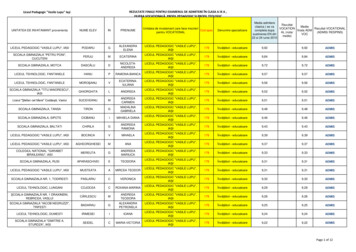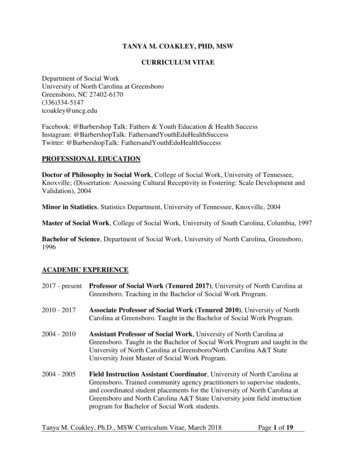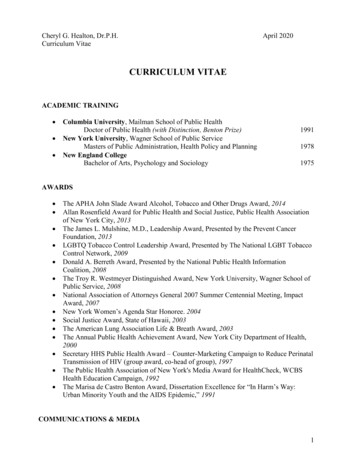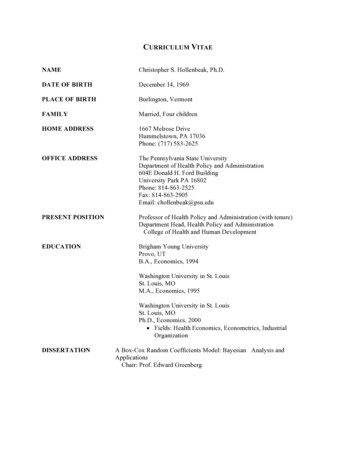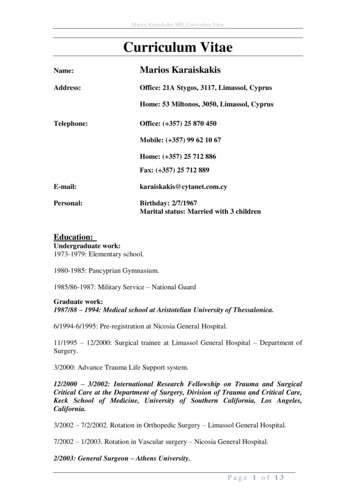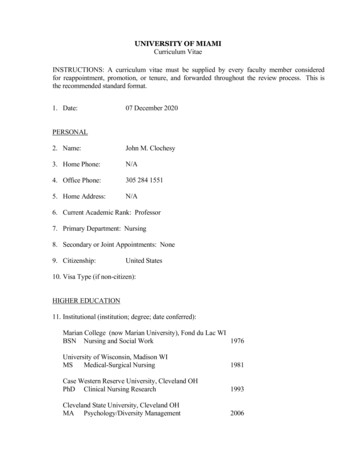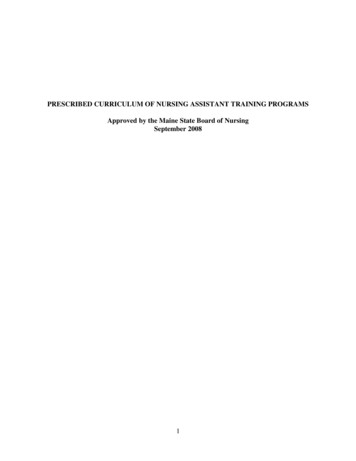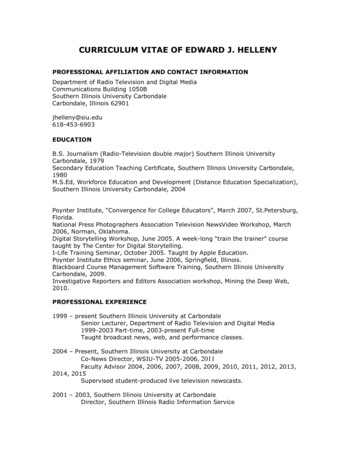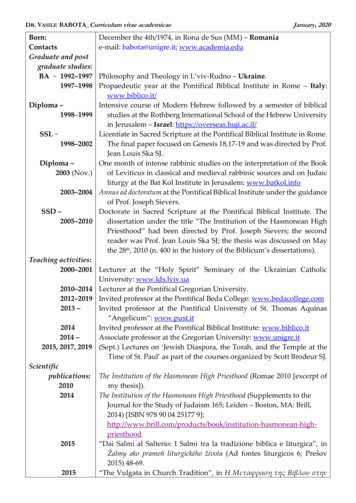
Transcription
DR. VASILE BABOTA Curriculum vitae academicaeBorn:ContactsGraduate and postgraduate studies:BA 1992–19971997–1998Diploma 1998–1999SSL 1998–2002Diploma 2003 (Nov.)2003–2004SSD 2005–2010January, 2020December the 4th/1974, in Rona de Sus (MM) – Romaniae-mail: babota@unigre.it; www.academia.eduPhilosophy and Theology in L’viv-Rudno – Ukraine.Propaedeutic year at the Pontifical Biblical Institute in Rome – Italy:www.biblico.it/Intensive course of Modern Hebrew followed by a semester of biblicalstudies at the Rothberg International School of the Hebrew Universityin Jerusalem – Israel: https://overseas.huji.ac.il/Licentiate in Sacred Scripture at the Pontifical Biblical Institute in Rome.The final paper focused on Genesis 18,17-19 and was directed by Prof.Jean Louis Ska SJ.One month of intense rabbinic studies on the interpretation of the Bookof Leviticus in classical and medieval rabbinic sources and on Judaicliturgy at the Bat Kol Institute in Jerusalem: www.batkol.infoAnnus ad doctoratum at the Pontifical Biblical Institute under the guidanceof Prof. Joseph Sievers.Doctorate in Sacred Scripture at the Pontifical Biblical Institute. Thedissertation under the title “The Institution of the Hasmonean HighPriesthood” had been directed by Prof. Joseph Sievers; the secondreader was Prof. Jean Louis Ska SJ; the thesis was discussed on Maythe 28th, 2010 (n. 400 in the history of the Biblicum’s dissertations).Teaching activities:2000–2001 Lecturer at the “Holy Spirit” Seminary of the Ukrainian CatholicUniversity: www.lds.lviv.ua2010–2014 Lecturer at the Pontifical Gregorian University.2012–2019 Invited professor at the Pontifical Beda College: www.bedacollege.com2013 –Invited professor at the Pontifical University of St. Thomas Aquinas“Angelicum”: www.pust.it2014Invited professor at the Pontifical Biblical Institute: www.biblico.it2014 –Associate professor at the Gregorian University: www.unigre.it2015, 2017, 2019 (Sept.) Lectures on ‘Jewish Diaspora, the Torah, and the Temple at theTime of St. Paul’ as part of the courses organized by Scott Brodeur SJ.Scientificpublications: The Institution of the Hasmonean High Priesthood (Romae 2010 [excerpt of2010my thesis]).2014The Institution of the Hasmonean High Priesthood (Supplements to theJournal for the Study of Judaism 165; Leiden – Boston, MA: Brill,2014) [ISBN 978 90 04 25177 hasmonean-highpriesthood2015“Dai Salmi al Salterio: I Salmi tra la tradizione biblica e liturgica”, inŽalmy ako prameň liturgického života (Ad fontes liturgicos 6; Prešov2015) 48-69.2015“The Vulgata in Church Tradition”, in Η Μετάφραση της Βίβλου στην
DR. VASILE BABOTA Curriculum vitae academicae2016201720192020 –January, 2020Εκκλησία και στην Εκπαίδευση (Athens 2015) 47-58.- et alii, “Abraham: Critical Issues”, “Moses: Critical Issues”, “Aaron, theHigh Priest: Critical Issues”, “Sanhedrin: Critical Issues”, in LexhamBible Dictionary for Logos Software Bible (Bellingham, WA: LexhamPress, 2016).“The Parabiblical Texts: From Biblical Texts to Pesharim”, Henoch 39/1(2017) 44-55.“I calendari liturgici al tempo di Gesù”, Il tempo e il calendario liturgico(Ad fontes liturgicos 7; Nyíregyháza 2017).“The Latin Version of the Prayer of Manasseh”, in Textual History of theBible, Vol. 2 (Leiden – Boston, MA: Brill, 2019).“ἀρνέομαι κτλ.”, in Historical and Theological Lexicon of the Septuagint,Vol. 1 (Tübingen: Mohr Siebeck, 2020).“Alexander Janneus as High Priest and King: Struggling between Jewishand Hellenistic Concepts of Rule”, Religions 11, 40 (2020): 1-17.“The Wicked Priest, the Righteous Teacher, and the Yahad: BasicQuestions and Some Proposals”, (Studies in the Texts of the JudeanDesert; Leiden: Brill, 2020) [forthcoming].“The Sons of Zadok, Alexander Janneus, and the Book of Ezekiel”, RevQ[forthcoming].“The Psalms of Solomon and the Temple” [forthcoming].“The Use of Ezekiel in ‘Sectarian’ Dead Sea Scrolls,” [forthcoming].“The Emergence of the Sons of Zadok in Ezekiel 40–48: A Literary,Historical, and Theological Approach” [forthcoming].“ἑρμηνεία, ἑρμηνευτής, ἑρμηνεύω κτλ.”, in Historical and TheologicalLexicon of the Septuagint [HTLS], Vol. 2 (Tübingen: Mohr Siebeck) [inprogress].“εὐαγγελία, εὐαγγέλιον, εὐαγγελίζω κτλ.”, in HTLS, Vol. 2 [inprogress].“ἔσχατος κτλ.”, in HTLS, Vol. 2 [in progress].“ἱερατεία, ἱεράτευμα, ἱερατεύω, ἱερεύς, ἱερωσύνη κτλ.”, in HTLS, Vol.2 [in progress].“ἱερόδουλος κτλ.”, in HTLS, Vol. 2 [in progress].“ἱερός κτλ.”, in HTLS, Vol. 2 [in progress].Reviews:2005-201620122014Collaboration with the Journal for the Study of Judaism in the Persian,Hellenistic and Roman Period (Brill), where I yearly publish in the issues2 & 4/5 my reviews of articles selected from about 20 various journalswhose fields of interest include biblical studies, ancient Judaism, NearEastern Studies, and early Christianity. These journals are publishedmostly in Italy, while others in Croatia, Poland, Romania, Russia,Slovakia, and Spain.Rainer Metzner, Kaiphas: Der Hohepriester jenes Jahres. Geschichte undDeutung (AJEC 75; Leiden – Boston, MA: Brill, 2010) in Biblica 93/1(2012) 145-148.Markus Saur, Einführung in die alttestamentliche Weisheitsliteratur(Wissenschaftliche Buchgesellschaft 168; Darmstadt, 2012) in
DR. VASILE BABOTA Curriculum vitae academicae2020January, 2020Gregorianum 95/2 (2014) 442.Renate Egger-Wenzel and Jeremy Corley (eds.), Emotions from Ben Sira toPaul (Deuterocanonical and Cognate Literature Yearbook 2011; Berlin:De Gruyter, 2012) in Gregorianum 95/2 (2014) 407-409.Walter Groß & Erasmus Gaß, Studien zum Richterbuch und seinenVölkernamen (Stuttgarter biblische Aufsatzbände 54; Stuttgart:Katholisches Bibelwerk, 2012) in Gregorianum 95/3 (2014) 662-663.Thomas Willi, Israel und die Völker. Studien zur Literatur und GeschichteIsraels in der Perserzeit (Stuttgarter biblische Aufsatzbände 55;Stuttgart: Katholisches Bibelwerk, 2012) in Gregorianum 95/3 (2014)665.Kenneth Atkinson, A History of the Hasmonean State: Josephus and Beyond(Jewish and Christian Texts 23; London – New York: Bloomsbury,2016) in Journal of Semitic Studies [forthcoming].Translations (fromItalian into in collaboration with Chris Seeman; Translation of a runningEnglish):commentary on Genesis through Revelation for the app “Bible ��,2013):http://bibleworld.it/en2014in collaboration with Chris Seeman; Translation of Giovanni Deiana,Introduzione alla Sacra Scrittura alla luce dei “Dei Verbum” (Città delVaticano: Urbaniana University Press, 2009 [English edition 2014]):www.urbaniana.it/uup/pubbl 2013/Deiana.htmConference papers:2005(March, 7-12): “Messianic Ideas in Early Hasmonean Times: The Case ofthe Hasmonean High Priesthood”, at the The Fourth World JewishCongress on the Interaction of Cultures, organized by the HebrewUniversity of Jerusalem, Israel.2013(Sept., 19-20): “The Importance of the Judean Desert Greek BiblicalScrolls for the Study of the Greek Bible”, at the International BiblicalConference «Biblical Studies, West and East: Trends, Challenges andProspects, organized by the Ukrainian Catholic University of L’viv,Ukraine.2014(Dec., 12-13): “The Importance of Vulgata in the Catholic Church”, at theΗ Μετάφραση της Βίβλου στην Εκκλησία και στην Εκπαίδευση,organized by the Hellenic Bible Society in Athens, Greece.2015(Nov. 20-21): “Dai Salmi al Salterio: I Salmi tra la tradizione biblica eliturgica”, at Žalmy ako prameň liturgického života, organized by theGréckokatolícka teologická fakulta Prešovskej Univerzity v Prešove inPreshov, Slovakia.2016(April 13-14): “The Hasmonean High Priesthood, the Opposition(s)Groups, and the Composition of Some Dead Sea Scrolls”, at The FifthGroningen–Leuven Encounter on the Dead Sea Scrolls: Dead Sea Scrolls andHellenism, organized by the Qumran Institute in Groningen,Netherlands.(Sept. 20-22): “From Parabiblical to Pesharim Texts”, at the Nuove luci sullaBibbia e l’Ebraismo: I manoscritti di Qumran a settant’anni dalla scoperta
DR. VASILE BABOTA Curriculum vitae academicae201720182019Other activities:2011January, 2020(1947-2017) e il Sefer Torah della Biblioteca Universitaria di Bologna,organized by the Associazione Italiana per lo Studio del Giudaismo inRavenna – Bologna, Italy.(Oct. 25-26): “I calendari liturgici al tempo di Gesù” at the Il tempo e ilcalendario liturgico, organized by the St. Athanasius Greek-CatholicInstitute in Nyíregyháza, Hungary.(Dec. 3-4): “Alexander Janneus as High Priest and King: StrugglingBetween Jewish and Hellenistic Concepts of Rule”, at the Kings andPowers: Exploring Jewish Texts in Their Hellenistic Contexts, organized bythe Academy of Finland’s Centre of Excellence of the University ofHelsinki, Finland.(Oct. 25-26): “The Teacher of Righteousness, the Wicked Priest, and theYahad: An Assessment of Older and More Recent Theories”, at theSeventieth Anniversary of the First Discoveries at Qumran and Elsewherein the Judean Desert, organized by the John Paul II Catholic Universityof Lublin, Poland.(July 9-11): “The Psalms of Solomon and the Temple”, at the Les Psaumesde Salomon: élaboration, formation, reception, at Les Psaumes des Salomon:3e colloque international, organized by Centre Paul-Albert Février”(TDMAM, AMU, CNRS) and the “Centre Sèvres” in Aix-en-Provence,France.(July 30-August 3): “The Sons of Zadok in the Dead Sea Scrolls and theInstitution of the Hasmonean Kingship”, at the Society of BiblicalLiterature International Meeting in Helsinki, Finland.– “The Emergence of the Sons of Zadok in Ezekiel 40–48: A Literary,Historical, and Theological Approach”, at the Society of BiblicalLiterature International Meeting in Helsinki, Finland.(May 7-9): “In Search of the Origins of the Pharisees (Poster)”, at the Jesusand the Pharisees: An Interdisciplinary Reappraisal, organized byPontifical Biblical Institute and the Cardinal Bea Centre for JudaicStudies.(July 1-5): “LXXEzekiel 36–42 in Codex B: A Comparison with LXX-967,MT, VL-W, and other Witnesses”, at the Society of Biblical LiteratureInternational Meeting in Rome, Italy.(Dec. 13-15): “Choosing and Depicting Characters from the FormerProphets in the Deuterocanonical Literature”, at the IntrabiblicalInterpretation of the Former Prophets, organized by the Studia BiblicaSlovaca in Badín, Slovakia.Revision and editorial work for the biblical series “Nuova Versione dellaBibbia dai Testi Antichi” (Milano: Edizioni “San Paolo”).Languages: Ancient research level: Biblical Hebrew, Biblical Greek, Church Latin,and Church Slavonic.Modern spoken: English, Italian, Romanian, Russian, Ukrainian; reading level: Croatian, French, Modern Hebrew, German, Polish,Portuguese, Slovak, Spanish.
DR. VASILE BABOTA Curriculum vitae academicaeJanuary, 2020The interest of my The institutions of biblical Israel with particular attention on the (high)teaching and/orpriesthood and the Temple/s; the Priestly (P) texts of the Pentateuch;research covers:Jewish literature of the Greco-Roman period; history of the SecondTemple period; the use and interpretation of biblical texts in lateantique Judaism and early Christianity; textual criticism of theHebrew Bible/Old Testament and New Testament.Current main ‘An Introduction to the Textual Criticism of the Hebrew Bible, Greekprojects:Bible/Septuagint (LXX), and the New Testament’.‘The Development of the Torah/Pentateuch: Between Textual Criticismand Literary Criticism”.Memberships (past Society of Biblical Literature (SBL), Associazione Biblica Italiana (ABI),and/or present):Catholic Biblical Association of America (CBA), European Associationfor Jewish Studies (EAJS), American Academy of Religion (AAR).
Lecturer at the Holy Spirit Seminary of the Ukrainian Catholic University: www.lds.lviv.ua Lecturer at the Pontifical Gregorian University. Invited professor at the Pontifical Beda College: www.bedacollege.com . organized by the Qumran Institute in Groningen, Netherlands. (Sept. 20-22 From Parabiblical to Pesharim Texts, .
